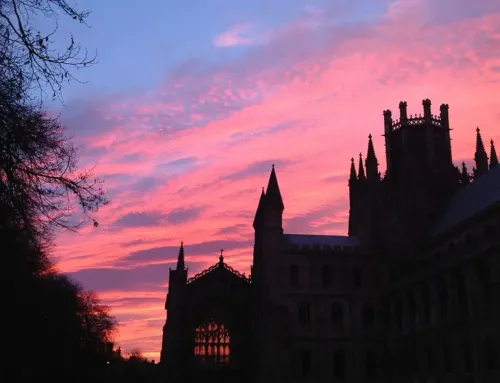Sometimes people have a certain intuition, a premonition, of their own imminent deaths. This may take the form of a vague sense of the approaching end, or a specific sign, but some seem to know it in a way that transcends natural knowledge. It is a distinct type of spiritual knowledge beckoning one’s attention to a coming spiritual passage.
The subject of death naturally gives rise to a few very personal questions: When my end is near, what will I be thinking about? What will I do in those final hours, days, weeks? What will be my final gift to the world?
A cleric’s impending death
These questions were very real for a Scottish Anglican clergyman named Henry Francis Lyte (1793-1847), who was an educated and likely also a very holy man. He was a pastor, preacher and hymn-writer, and although we can make no judgment on his soul – that is up to God – we may certainly judge the beauty of his life’s work.
Lyte’s last and most famous poem is the deeply consoling and lovely “Abide with Me! Fast Falls the Eventide” (usually shortened to the more manageable, “Abide with Me”). It is one of the most beloved poems of the English language. Apparently, he intended it to be a church hymn, and we are told his original musical arrangement was not memorable, but it is still frequently sung to other very beautiful compositions, one of which you’ll hear in the rendition below.
Lyte is better known for another hymn of great beauty and devotion, “Praise, My Soul, the King of Heaven”, which most faithful churchgoers would easily recognize.
Last will and testament
After his death at the young age of 54, his daughter told the touching story of her father’s last composition, which was created a few months before his death.
Lyte had suffered from ill-health all his life. He was getting ready to go abroad to receive treatment for tuberculosis when he seemed to realize that his end was near. Despite being sick, he steeled himself to preach his last sermon on a Sunday in late September of 1847 and at the end of the same day commended a hand-written copy of his poem to a relative who later published it.
The clergyman passed away about three weeks later without having preached another sermon. His final “sermon”, in fact, was his most memorable hymn which has given delight to generations of believers. There is hardly a more wonderful last will and testament for a man who spent his life giving the solace of God to others.
The video below is a performance of the hymn by the famed King’s College Choir, Cambridge. You may wish to skip down and read the “What to look for” section before you listen to the performance or just dive right in and read the commentary afterward. Either way, you’re sure to enjoy Lyte’s blessed hymn.
The performance (duration: 4:52)
What to look for
Here are a few details to pay attention to when contemplating this literary gem:
- Each verse consists of four lines and ends with the three-word refrain “abide (or the poetic “bide”) with me”. These eight refrains form a steady, repetitive petition throughout the poem that leads the devoted heart deeply into prayer.
- Lyte wrote the poem in iambic pentameter, the most familiar poetic meter. Each line consists of five two-syllable units with the accent falling always on the second syllable. So, it is read, “Ab-ide | with me | fast falls | the e |ven tide”. It is poetry, of course, not everyday speech, but with a little practice, you will appreciate the flow of this meter which creates the feeling of a “skipping” motion of words and sounds.
- The third line of every verse concludes with a word that ends in the “ee” sound in order to rhyme with the final refrain, “… abide with me”. So, flee / see / free / plea…, etc.
- The first two lines of each verse always rhyme with each other: eventide/abide, day/away, word/Lord, and so forth for all eight.
- Note the wonderful imagery that Lyte uses to describe his Lord Jesus: “Help of the helpless”, “Friend of sinners”, “King of kings”, “my guide and stay”, among others.
- The poem has the aura of a man who was gazing into eternity and beholding the loveliness of God. The second verse “Swift to its close ebbs out life’s little day” contrasts the world of passing things with the eternity of God (“Thou who changest not….”). The entire final verse gives the impression that the poet is seeing directly into heaven.
- My favorite verse is the fifth where the poet reflects on God’s fidelity and presence throughout his “rebellious and perverse” younger years. Most adults can probably relate to this sentiment!
It is not surprising that this poem has been reprinted in hymn books and devotional manuals many times since Lyte died in 1847. Its wonderful verses make for a deeper awareness of earthly fragility balanced by the assurance of our faith in the world to come.
Verses
Abide with me; fast falls the eventide;
The darkness deepens; Lord with me abide.
When other helpers fail and comforts flee,
Help of the helpless, O abide with me.
Swift to its close ebbs out life’s little day;
Earth’s joys grow dim; its glories pass away;
Change and decay in all around I see;
O Thou who changest not, abide with me.
Not a brief glance I beg, a passing word;
But as Thou dwell’st with Thy disciples, Lord,
Familiar, condescending, patient, free.
Come not to sojourn, but abide with me.
Come not in terrors, as the King of kings,
But kind and good, with healing in Thy wings,
Tears for all woes, a heart for every plea—
Come, Friend of sinners, and thus bide with me.
Thou on my head in early youth didst smile;
And, though rebellious and perverse meanwhile,
Thou hast not left me, oft as I left Thee,
On to the close, O Lord, abide with me.
I need Thy presence every passing hour.
What but Thy grace can foil the tempter’s power?
Who, like Thyself, my guide and stay can be?
Through cloud and sunshine, Lord, abide with me.
I fear no foe, with Thee at hand to bless;
Ills have no weight, and tears no bitterness.
Where is death’s sting? Where, grave, thy victory?
I triumph still, if Thou abide with me.
Hold Thou Thy cross before my closing eyes;
Shine through the gloom and point me to the skies.
Heaven’s morning breaks, and earth’s vain shadows flee;
In life, in death, O Lord, abide with me.

Soul Work
This poem begs to be memorized (at least a couple verses). My prayer book version has verses 1, 2, and 8, which are now permanently etched upon my heart. Can you make it part of your spiritual repertoire?
Although it’s not an easy exercise, take the occasion today to reflect on that final moment of your life. If you had a premonition that your end was coming soon, what would you need to do to get your spiritual affairs in order and leave a legacy for your loved ones? What will be the final prayer on your lips?
These types of reflections and the sentiments of the poem are an expression of the Christian virtue of Hope. It is a theological virtue that St. Paul says is one of the spiritual gifts that will remain for eternity (1 Corinthians 13:13) – and God certainly gives this gift to all who ask.




Leave A Comment